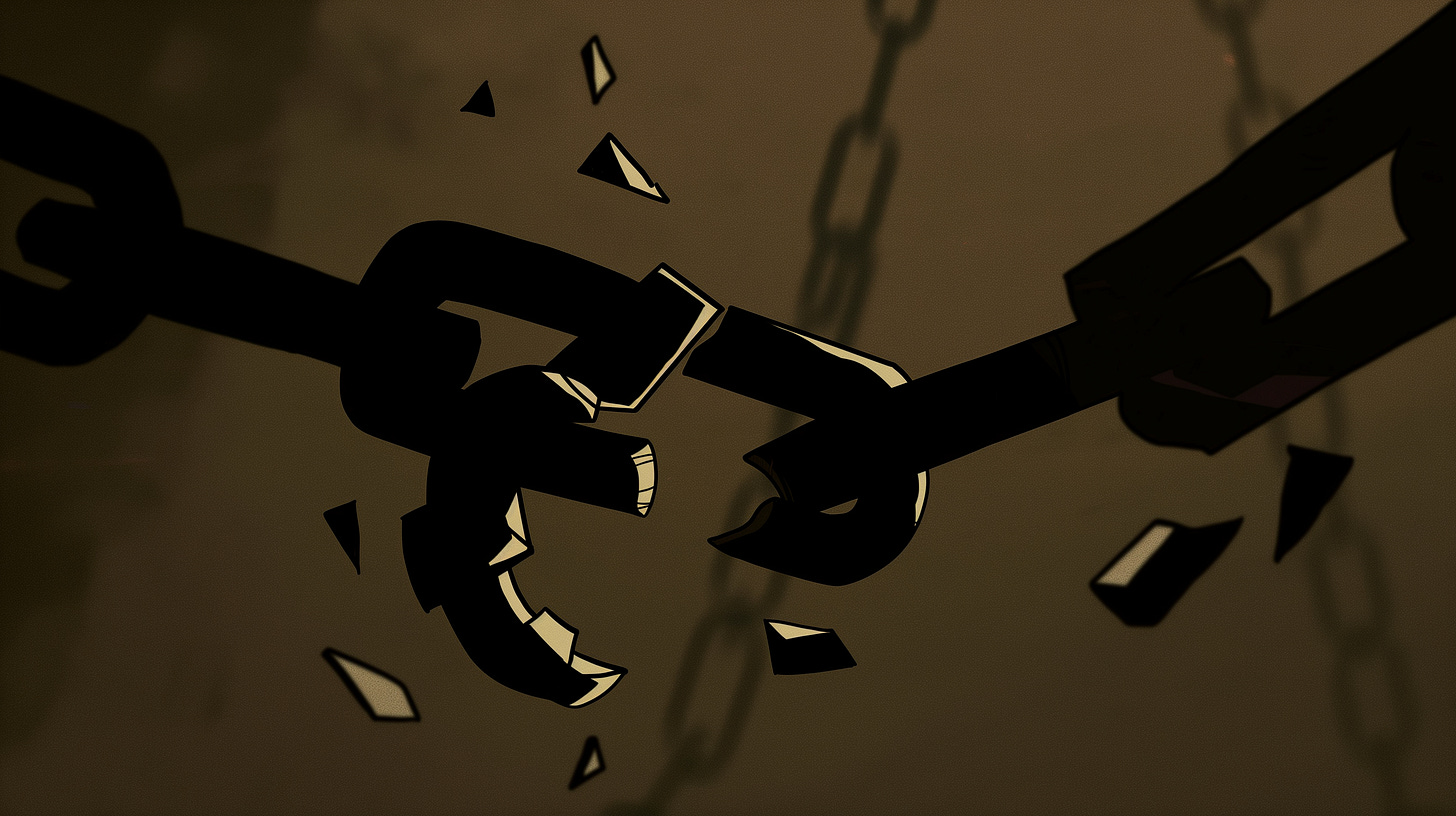Introduction
The concept of prisons and chains as metaphors for spiritual bondage to sin is a recurring theme in the Bible. From the Old Testament prophecies to the New Testament accounts of Jesus' ministry, this symbolism helps to illustrate the spiritual reality of sin's hold on humanity and the liberation offered through faith in Christ. This essay explores the biblical use of "prisons" and "chains" to signify spiritual bondage, the fulfillment of prophecies through Jesus Christ, the ongoing struggle with sin among believers, and the ultimate freedom found in Christ. Through a detailed examination of scripture, we will uncover the profound truths these metaphors convey and how they apply to our lives today.
Symbolism of Prisons and Chains
The Bible frequently employs the imagery of prisons and chains to represent the bondage of sin. In Isaiah 61:1, the prophet declares the mission of the Messiah: "The Spirit of the Sovereign Lord is on me, because the Lord has anointed me to proclaim good news to the poor. He has sent me to bind up the brokenhearted, to proclaim freedom for the captives and release from darkness for the prisoners." This passage, later echoed by Jesus in Luke 4:18-19, underscores the spiritual nature of the captivity being addressed. Jesus did not set physical prisoners free, as evidenced by his cousin John the Baptist remaining in Herod's prison. Instead, this proclamation pointed to a deeper liberation from the spiritual bondage of sin and darkness.
Metaphorical Meaning of Captivity
The metaphorical meaning of captivity in these scriptures becomes evident when we consider the life and ministry of Jesus. Although He performed many miracles and delivered people from various forms of oppression, His primary mission was to address the root cause of all bondage: sin. The account of the demonized man in shackles in Mark 5:1-20 vividly illustrates this point. Despite the man breaking physical shackles, his true freedom only came when Jesus cast out the demons possessing him. This story highlights that true freedom is spiritual and can only be achieved through divine intervention.
The Spiritual Bondage of Sin
Sin is not just a set of actions; it is a state of being that holds individuals in spiritual bondage. This bondage is not limited to those who have not yet accepted Christ; it can also affect Christians who continue to struggle with sin. Romans 6:16-18 explains that people are slaves to whatever they obey, whether it is sin leading to death or obedience leading to righteousness. When we sin, we become ensnared by that sin, living in a prison of our own making. This reality emphasizes the importance of recognizing and addressing sin's hold in our lives, even after coming to faith in Jesus.
Christian Struggle with Sin
The struggle with sin is an ongoing battle for many Christians. Despite professing faith in Jesus, believers can still fall into patterns of sin that create spiritual bondage. This is a prison of our own sin, a condition where we find ourselves trapped by habits, thoughts, and actions that contradict our faith. The Apostle Paul reflects on this struggle in Romans 7:19-20, where he laments doing the evil he does not want to do, acknowledging the sin living within him. This internal conflict illustrates that the battle against sin is ongoing and requires continual reliance on Christ for victory.
One of the most striking examples of spiritual bondage in the New Testament comes from the religious leaders of Jesus' day. Despite their outward piety and rigorous adherence to the law, the Pharisees and Sadducees were often spiritually blind and in chains. This reality serves as a powerful reminder that the chains of sin can bind anyone, including those who profess faith and hold positions of religious authority.
Jesus: The Liberator of Captives
The central message of the Gospel is that Jesus came to set the captives free. This freedom is not merely a physical release but a profound spiritual liberation. Jesus Himself declared this mission in Luke 4:18-19, quoting Isaiah 61:1-2. Throughout His ministry, Jesus demonstrated His power to break spiritual chains, heal the brokenhearted, and proclaim liberty to the oppressed. This divine power to liberate is available to all who believe in Him. However, knowledge and belief are two separate things.
The Power of Faith in Jesus
Belief in Jesus' power to break spiritual chains is crucial for experiencing freedom. The account of Jesus' inability to perform miracles in Nazareth due to the people's unbelief (Mark 6:5-6) serves as a stark reminder that unbelief can keep us in bondage. Faith is the key that unlocks the power of God's Word and sets us free from the chains of sin. Hebrews 11:6 emphasizes that without faith, it is impossible to please God, underscoring the necessity of believing in Jesus' power to liberate us from spiritual bondage.
The Lie of Sin and the Truth of God's Word
At the heart of sin's bondage is the belief in a lie. Satan, the father of lies, uses deception to keep people in chains. Jesus declared in John 8:32, "Then you will know the truth, and the truth will set you free." To sin is to believe a lie, whether it is about our identity, our worth, or God's nature. Identifying and rejecting these lies is essential for breaking free from spiritual bondage.
Identifying and Rejecting Lies
To experience freedom, we must first identify the lies that have kept us in bondage. Three of the most common lies that keep us in the chains of sin are shame ("There is something wrong with me"), unworthiness ("No one would forgive me after what I have done"), and unlovability ("If you knew me, you wouldn’t love me"). These lies are powerful tools used by the enemy to keep people in bondage. However, the truth of God's Word provides the antidote to these destructive falsehoods.
The Lie of Shame: "There is something wrong with me"
Shame is a pervasive lie that tells us we are fundamentally flawed and unworthy of love or acceptance. This lie drives many to seek solace in addictive behaviors, attempting to numb the pain of feeling defective, or lock us into behavior patterns that destroy relationships in our life. However, the Bible reveals a different truth about our identity in Christ.
Scriptural Antithesis:
Psalm 139:14: "I praise you because I am fearfully and wonderfully made; your works are wonderful, I know that full well." This verse affirms that we are intentionally and beautifully created by God, countering the lie that there is something inherently wrong with us.
Ephesians 2:10: "For we are God’s handiwork, created in Christ Jesus to do good works, which God prepared in advance for us to do." This verse emphasizes that we are God's masterpiece, designed with purpose and value.
The Lie of Unworthiness: "No one would forgive me after what I have done"
Unworthiness is the belief that our past actions have rendered us unforgivable and beyond redemption. This lie can trap individuals in a cycle of guilt and addiction as they believe there is no hope for forgiveness. However, the Bible speaks powerfully about God's readiness to forgive and restore us.
Scriptural Antithesis:
1 John 1:9: "If we confess our sins, he is faithful and just and will forgive us our sins and purify us from all unrighteousness." This promise assures us that God is faithful to forgive and cleanse us from all sin, no matter our past.
Psalm 103:12: "As far as the east is from the west, so far has he removed our transgressions from us." This verse vividly illustrates the completeness of God's forgiveness, removing our sins infinitely far from us.
The Lie of Unlovability: "If you knew me, you wouldn’t love me"
Unlovability is the belief that we are unworthy of love and that no one truly cares for us. This lie can drive individuals into patterns of negative behavior as they seek to fill the void of feeling unloved. Yet, the Bible declares God's profound love for each of us.
Scriptural Antithesis:
Romans 5:8: "But God demonstrates his own love for us in this: While we were still sinners, Christ died for us." This verse highlights the unconditional nature of God's love, demonstrated through Jesus' sacrifice even when we were at our worst.
Zephaniah 3:17: "The Lord your God is with you, the Mighty Warrior who saves. He will take great delight in you; in his love, he will no longer rebuke you but will rejoice over you with singing." This verse portrays God's deep affection and joy over us, affirming our inherent lovability.
Speaking the Truth Against the Enemy
When we believe and proclaim the truth of God's Word, we wield a powerful weapon against the enemy. Revelation 12:10-11 describes Satan as the accuser of the brethren, but believers overcome him by the blood of the Lamb and the word of their testimony. Speaking God's truth aloud drives away the lies that seek to bind us in the supernatural realms. We declare publicly to the enemy that we are His and believe his truth and the devil flees from us.
Confession, both of our sins and of God's truth, plays a vital role in breaking spiritual chains. 1 John 1:9 promises that if we confess our sins, God is faithful and just to forgive us and cleanse us from all unrighteousness. Additionally, proclaiming the truth of God's Word helps to solidify our faith and resist the enemy's attacks. When we declare scriptures that affirm our identity in Christ, we experience the truth of God’s word rather than just retaining a head knowledge of it.
Living as Free People
Once we have been set free by the truth of God's Word, we are called to live as free people. Galatians 5:1 urges us to stand firm in the freedom Christ has given us and not be burdened again by a yoke of slavery. This freedom empowers us not only to live victoriously over sin but also to help others find liberation in Christ.
Free people free people
As recipients of Christ's liberating power, we have the responsibility to share this freedom with others. Matthew 28:19-20, known as the Great Commission, calls us to make disciples of all nations, teaching them to obey everything Jesus commanded. Part of this mission involves helping others break free from the spiritual chains that bind them. By sharing our testimony and the truth of God's Word, we can lead others to the freedom we have found in Christ.
For tools to help yourself and others get free of the bondage to sin, go to ficm.org.
Conclusion
The Bible's use of prisons and chains as symbols for spiritual bondage to sin provides a powerful illustration of the human condition and the liberating power of Jesus Christ. Through faith in Him, we can break free from the lies that enslave us and live in the freedom He offers. This freedom is not just for our benefit but also empowers us to help others find liberation. As we continue to trust in Jesus and proclaim His truth, we can live victorious lives, free from the chains of sin, and bring glory to our Father in Heaven.
Have you succumbed to the bondage of sin in your life? Are you wearing spiritual shackles despite your faith in Jesus? If so, say this prayer:
Father, I have sinned against you. Despite the truth of your word, I have chosen my own way and it has led into the spiritual bondage I am currently wrestling with. I believe your son Jesus is the way, the truth and the life. I will confess my sins to a brother or sister in your church and in so doing break the chains of bondage in my life. Help to find the lies I have been believing and to find the truth in your scripture to break the chains of that lie in my life. Thank you for providing a way to get free of my chains. In Jesus’s mighty name, Amen!
Footnotes
Isaiah 61:1 NIV - "The Spirit of the Sovereign Lord is on me, because the Lord has anointed me to proclaim good news to the poor. He has sent me to bind up the brokenhearted, to proclaim freedom for the captives and release from darkness for the prisoners."
Luke 4:18-19 NIV - "The Spirit of the Lord is on me, because he has anointed me to proclaim good news to the poor. He has sent me to proclaim freedom for the prisoners and recovery of sight for the blind, to set the oppressed free, to proclaim the year of the Lord's favor."
Mark 5:1-20 NIV - The account of Jesus healing the demon-possessed man.
Romans 6:16-18 NIV - "Don't you know that when you offer yourselves to someone as obedient slaves, you are slaves of the one you obey—whether you are slaves to sin, which leads to death, or to obedience, which leads to righteousness?"
Romans 7:19-20 NIV - "For I do not do the good I want to do, but the evil I do not want to do—this I keep on doing. Now if I do what I do not want to do, it is no longer I who do it, but it is sin living in me that does it."
Mark 6:5-6 NIV - "He could not do any miracles there, except lay his hands on a few sick people and heal them. He was amazed at their lack of faith."
John 8:32 NIV - "Then you will know the truth, and the truth will set you free."
Romans 5:8 NIV - "But God demonstrates his own love for us in this: While we were still sinners, Christ died for us."
Zephaniah 3:17 NIV - "The Lord your God is with you, the Mighty Warrior who saves. He will take great delight in you; in his love, he will no longer rebuke you but will rejoice over you with singing."
Revelation 12:10-11 NIV - "Then I heard a loud voice in heaven say: 'Now have come the salvation and the power and the kingdom of our God, and the authority of his Messiah. For the accuser of our brothers and sisters, who accuses them before our God day and night, has been hurled down. They triumphed over him by the blood of the Lamb and by the word of their testimony; they did not love their lives so much as to shrink from death.'"
1 John 1:9 NIV - "If we confess our sins, he is faithful and just and will forgive us our sins and purify us from all unrighteousness."
Galatians 5:1 NIV - "It is for freedom that Christ has set us free. Stand firm, then, and do not let yourselves be burdened again by a yoke of slavery."
Matthew 28:19-20 NIV - "Therefore go and make disciples of all nations, baptizing them in the name of the Father and of the Son and of the Holy Spirit, and teaching them to obey everything I have commanded you. And surely I am with you always, to the very end of the age."
Bibliography
The Holy Bible, New International Version. Biblica, Inc., 2011.
"Spiritual Warfare and Deliverance: A Biblical Guide to Freedom from Demonic Oppression" by Daniel R. Harder
"Breaking Free: Discover the Victory of Total Surrender" by Beth Moore
"Bondage Breaker: Overcoming Negative Thoughts, Irrational Feelings, and Habitual Sins" by Neil T. Anderson
"Victory Over Darkness: Realize the Power of Your Identity in Christ" by Neil T. Anderson
“The Mind of the Spirit: Paul's Approach to Transformed Thinking” by Craig S. Keener
“Clean” by Dr. Douglas Weiss
“Out of the Shadows: Understanding Sexual Addiction” by Patrick Carnes





